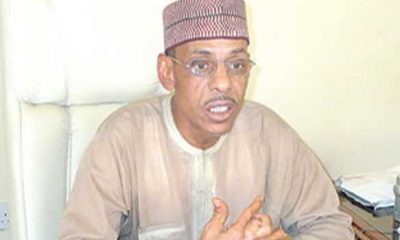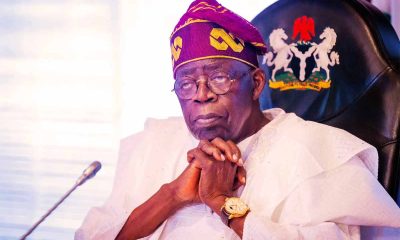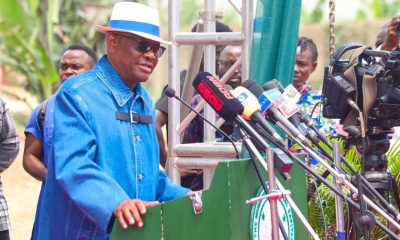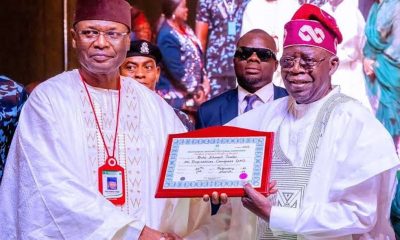Opinion
President Tinubu is not deaf

President Tinubu is not deaf
Tunde Odesola
(Published in The PUNCH, on Friday, February 9, 2024)
Daybreak Nigeria! All the make-up is gone now. On the forehead are lines of wrinkles. Short tears dry up midway down the sides of the nose, forming the ruthless eyeshadows of the tiger. The smile has turned into a sneer, the cheers are swallowed up by jeers, and laughter has ceased, seized by weeping and gnashing of teeth across the land. The calamity is total.
Now, the rich are also crying. Those not crying are shivering. Because nowhere is safe; palaces or huts. No one is smiling; kings or paupers. The American dollar is gripped by the spirit of Joseph’s dream, it’s now swallowing the naira. One dollar, just one dollar, is now swallowing one thousand five hundred naira. Èemò wòlú!
The land is bitter. Hunger is raining. Poverting is pollinating. Death is reigning. Bola Ahmed Tinubu, the man, who assured the citizenry, saying, “E lo f’okan bale,” appears lost. The Asiwaju called BAT also said, “Let the poor breathe,” but the air has ceased. The poor can’t inhale, the rich can’t exhale. Yoruba kings have become chickens inside a pitch-black cage, and the Fulani cobra coils up in a corner, snacking them up one by one – after its regular feast on the people. The bat of the night has lost its voice.
But, the purpose of this article isn’t to paint our country in sad colours. It’s to make you laugh and forget the woes besetting our beloved country – even if only momentarily. The expression, “Òrò burúkú tòhun tèrín,” signposts the junction called Bittersweet. Inside his regalia, the egungun must endure his fart, he dares not tear off his mask. Èewò òrìsà! The Abami Eda – Fela Anikulapo – called it Shuffering and Shmiling.
Imagine you bought a plate of rice, beans, veggies and chicken. Iya Ramota, the food seller, tells you to go home and wait for your order. Back at home, you waited all day, and Iya Ramo didn’t show up. At midnight, she shows up with a big plate and a toothpick in her hands. She picks a grain of rice with the toothpick and puts it in your mouth. She also remembers to put in a grain of beans before she leaves with the food. You jump up, shouting Up Iya Ramo!
Isn’t this what you do when you shout ‘Up NEPA!’ after being ripped off by the Power Holding Company of Nigeria – when you should be shouting, ‘wahala, wahala, wahala’ – in the voice of that irritant musician in Sango, Ogun State, whose wisecracks overflows from a portable suitcase? Isn’t that shuffering and shmiling?
READ ALSO:
- Police kill notorious kidnappers terrorizing Abuja, Kaduna, 2 other states
- Generator fumes kill 2 Kogi Polytechnic students
- Super Eagles to get N8.9bn for AFCON win
Pneumonoultramicroscopicsilicovolcanoconiosis is the longest word in the English dictionary. You can count how many letters it has, good luck. But don’t try to pronounce it, please. I don’t want to be held responsible for missing teeth, biko. Do not say I didn’t warn you o, ehn-ehn, because Nigeria is a now country where a packet of unadulterated antibiotic costs between N45,000 and N60,000 when the minimum wage of over 104 million citizens remains N30,000, according to the World Bank figures.
Pneumonoultramicroscopicsilicovolcanoconiosis is a fibrotic lung disease caused when you breathe in chemical dust such as silica, coal dust or asbestos. Yes, asbestos! Asbestos is a potential killer outlawed for building in developed countries.
Silicosis is another name for pneumonoultramicroscopicsilicovolcanoconiosis. Yet another synonym for it is ‘black lung’. It’s also called pneumoconiosis. When I consider the various names of the disease, I see the developed world running with the simplified versions, researching, while Nigeria, the h(r)ope of the black man, smokes on a keg of gunpowder.
Growing up, I listened to the sweet voice of King Sunny Ade, singing “Ile o labo sinmi oko…,” a song he did about his journey to London, extolling the importance of home over the farmstead. Kennery King, Orlando Owoh, also did a song, ‘Ero ki yeye mi,” in praise of home. Before KSA and Orlando’s songs, Chief Commander Ebenezer Obey had done a song about the importance of home.
Home is a place of refuge. It’s a stockade to leave and return to after toilings afield. Many years ago, Nigerians in the Diaspora considered Nigeria as home, and their foreign abodes as farmsteads because home is where you feel secure and loved, wanted. The reverse is the case now. Nigeria has turned into oko (farmstead) while foreign abodes have become homes.
About 700 years ago, Africa was invaded for slaves by the West. About 500 years later, slavery was abolished and a new form of slavery called colonisation started. Though Nigeria gained independence from British colonial rule in 1960, the domineering influence of the British and America over the country is still strong, owing to corruption and misgovernance by Nigerian rulers.
Nigeria’s former slave masters have long departed, and the land has been despoiled. Nigerians themselves are the ones now begging to go and be slaves in foreign lands. They risk lives and limbs, stowing away on planes and ships because the country is no longer at ease. What would Nigerian children taken or born abroad be? Where would they call home? Nigeria or foreign lands?
READ ALSO:
- Excess herbal drink kills 2 Kogi residents, others hospitalised
- AFCON: Kogi man dies celebrating Super Eagles victory against South Africa
- Another Nigerian dies in Ogun while watching Nigeria-South African match
Last week, I shook my head when I heard that a friend of mine, in a bid to erase his family’s link with a particular Yoruba river, had changed his name to reflect his Christian religion. But Jesus Christ never told any of his disciples to change their family names which reflected their pagan histories.
Two days ago, Madison Academy in Alabama, USA, announced the return of Mustang Mud Run 5K, calling on interested participants to reserve their spots. The announcement says, “Prepare to have fun and put your skills to the test in North Alabama’s Mud Run. The obstacle course, situated on the campus of Madison Academy, will challenge participants with 18-22 obstacles along and through Indian Creek and the adjacent wooded areas. The family-friendly, fun mud run is open to anyone over the age of 12. Runners are expected to slip, slide, climb, jump, slog, and swing their way to a fun finish.”
Were this event native to Nigeria, many zealots, who have made pastors and imams their gods, would say the sport belonged to the devil, forgetting that they themselves are from mud! They would cast and bind and speak in tongues.
The zealots, their pastors and imams won’t pray hail and brimstones on the political leadership that has refused to hand over criminal cop, Abba Kyari, to the US, for trial over alleged involvement in wire fraud. Kyari, while on suspension over involvement in wire fraud, was caught on video negotiating the release of 25kg of cocaine for $61,000. He remains a member of the Nigeria Police Force to date, earning a salary.
It’s funny how we run this type of unjust country and still expect birds to chirp like birds, and rats squeak like rats. Ka ma ri ni Poolu wi. Apostle Paul says such an expectation is a mirage.
So, I hissed when Fuji singer, Wasiu Ayinde, called on President Tinubu in a viral video, telling him that Nigerians are shuffering. If the President doesn’t know by now that Nigerians are living in the worst of times, and it takes a bard to call his attention to it, it’s time to wind down the country and give it back to Britain or America for colonisation. But I would prefer the Chinese. I love their language.
Email: tundeodes2003@yahoo.com
Facebook: @Tunde Odesola
X: @Tunde_Odesola
Opinion
How Wande Abimbola rejected IBB’s ING bait, and other stories (3)

How Wande Abimbola rejected IBB’s ING bait, and other stories (3)
Tunde Odesola
(Published in The PUNCH, on Friday, April 4, 2025)
Abimbola’s eyes had seen 999 battles; so, one more battle would not make him go blind. Having survived a milestone of battles, it was natural for Abimbola to deploy his greatest weapon, Ifa, to prosecute the students’ battle that raged during his tenure as vice-chancellor of the University of Ife.
The Babalawo’s eyes had seen many òkun (oceans) and countless òsà (lagoons), so he would not panic at the sight of isún (springs). Wande had fought many wars, yet he remained unbowed, standing on the rock of truth.
In the military years of the 1980s, vice-chancellors of federal universities were statutorily entitled to a first term of four years and, if reappointed, got a three-year second term.
In Abimbola’s seven years of vice-chancellorship (1982-1989), Great Ife witnessed giant strides, such as the purchase of a $1.2bn first-in-Africa accelerator for nuclear research energy and medicine – bought from France in 1986; establishment of 23 linkages with various world-class citadels of knowledge, maintaining peace and tranquility among staff and students, and supporting teaching, research and development.
“The university had a bank account in New York and an office in the UK, manned by whites. When an official of the university visited a university in the UK or our students went for exchange programmes, they– white officials employed by Ife– were the ones who saw to protocols, arranging for hotels, etc. It was a liaison office where those inquiring about our university could go and make inquiries. We had lots of money in the university’s accounts in the UK and New York City.
“But, in line with a Federal Government directive that later emerged and forbade public institutions from running foreign accounts, Education Minister, Prof Jubril Aminu, said we should close down the account and all the money in the account was moved through the education ministry to Federal Government’s account in 1986,” Abimbola said.
READ ALSO:
- South African court acquits Nigerian pastor of rape after 8 years in jail
- Man jailed 3 months for non-declaration of $30,000 at airport
- More heads to roll in NNPCL, subsidiaries as Ojulari assumes office
In the same year, an external battle spilled over to Great Ife when Ife students, in solidarity with their Ahmadu Bello University colleagues, planned to embark on a protest called Ango-Must-Go.
Agronomy expert, Prof Ango Abdullahi, was the vice-chancellor of ABU, whom protesting students accused of callousness, following an increase in school fees, among many other allegations. Abdullahi had reportedly invited the police to quell a peaceful protest, an authoritarian action, which some newspapers said resulted in the rape, maiming and killing of students and non-students by the police.
A slew of Western press, including BBC, Voice of America, The Washington Post, Chicago Tribune, etc. reported in 1986 that many lives were lost to the ABU riot, with Nigerian newspapers lamenting, “Abdullahi expressed no regrets inviting the police,” and that he said, “only four people died.”
Currently, Abdullahi is a Commander of the Order of the Niger (CON deleted) and he holds the Magajin Rafin Zazzau traditional title. He is 86 years old.
Abimbola said, “Higher institution students from all over the country had gathered in our university. They wanted to hold the mother of all rallies because some of their colleagues had been killed by the police in ABU, Zaria.
“Security reports showed that the external students were in their thousands and had joined forces with our student population that numbered up to 30,000 because Moore Plantation, Ibadan; Adeyemi College of Education, Ondo; and the Institute of Agriculture, Akure, were part of UNIFE then.
“The students were charging themselves up all through the night, singing, dancing and drinking, preparatory to a grand protest the next morning. The fear of the unknown gripped the university community because nobody could predict what the external students could do, but we know our students were not destructive.
“I consulted Ifa, and Ifa told me what to do. In the middle of the night called óru ògànjó, I did what Ifa told me to do. Subsequently, loud and strange sounds reverberated through the university, sending shivers down the spines of the students who stopped singing and dancing, with the foreign students fleeing the campus as early as 5 a.m., while our students ceased all protest activities and went back to class. I am a lover of freedom of expression and association, but I could not leave the university community at the mercy of the foreign students, who could have wreaked havoc because they did not know the Ife tradition of protest.”
READ ALSO:
- Barcelona beat Atletico to set up cup final against Real Madrid
- NNPCL hikes petrol pump price to N950/litre
- Liverpool leap closer to title with narrow Everton win
So, I asked Awise Agbaye if African traditional bulletproof could stop AK-47 bullets. “No, it cannot,” Abimbola said. Abimbola’s response was in tandem with the answer given by the Araba of Osogbo, Chief Ifayemi Elebuibon, whom I had asked the same question some time ago.
In my article, “Can African bulletproof stop AK-47 bullets?”, published in The PUNCH, on January 18, 2021, a former Military Administrator of Lagos State, Brigadier-General Olagunsoye Oyinlola, said no African traditional bulletproof can stop bullets from AK-47 rifle, a position which pan-Yoruba activist, Sunday Adeyemo, aka Sunday Igboho, opposed, saying he had ‘authentic’ African traditional bulletproof that could stop AK-47 bullets. The Ooni, Oba Adeyeye Ogunwusi, also said in a telephone interview with me that ‘ayeta’ could stop bullets from an AK-47.
However, Oyinlola, who fought in the Chadian crisis of the 1980s and (also deleted) led Nigeria’s contingent to the United Nations’ peacekeeping mission in Somali in the early 1990s, said, “In the dane guns that masqueraders use in deceiving people, it is the gunpowder in them that explodes, they have removed the balls in the guns. As for soldiers missing their target when shooting at armed robbers tied to stakes, you must realise that it is not easy to kill a fellow human being.
“Some of the soldiers are newly recruited. Some shut their eyes and shoot up. There was a time that the officer commanding the shooting had to kick out one of the soldiers because he was closing his eyes and shooting up. If it was ‘ayeta’ that made bullets not penetrate the robbers’ bodies initially, why did they die eventually?”
Despite being armed, Sunday Igboho and some of his men fled when the democratic dictatorship of former President Muhammadu Buhari sent AK47-wielding killers in DSS uniform after him in his Ibadan home at night, following his strident condemnation of the widespread killing of Yoruba farmers by Fulani herdsmen in the South-West. One of Igboho’s men, who had charms all over his body, was killed and his corpse taken away by the killer DSS men.
READ ALSO:
- Protect vulnerable Nigerians, IMF tells Tinubu
- Ex-NYSC DG Tsiga regains freedom after 56 days in captivity
- Notorious bandit leader Bello Turji goes berserk, kills 12 to celebrates Eid
In an interview with me, Abimbola recalled that French soldiers cut off the charmed bracelets, amulets, gourds and cowries that Nigerian volunteers to WW1 had on their bodies.
Recounting how his father enlisted in WW1, Abimbola said, “ My father was playing ‘ayò olópón’ with six others in Oyo when the town crier came and announced the war. From the ayò game, they all voluntarily went to the palace and were enlisted to fight on the side of France in Cameroon between 1914 and 1916. This was when European allied forces were fighting Germany and taking over Germany-colonised territories worldwide during the fallout of WW1. Germany had colonised portions of Cameroon, which France took over during the war.
“The coalition took back all the African territories controlled by Germany. The countries include Tanganyika, now Tanzania, Rwanda/Burundi, Namibia, Cameroon and Togo. When I went to France in 1986 to purchase the accelerator, I told French authorities that my father fought on the side of France during WW1, they collected my father’s name, and the next day, they came and told me it was true, saying I could apply for French citizenship on account of my father’s participation in the war. But I did not.
“It was my grandfather, Akinsilola, nicknamed Légbejúre (fàdá owó è pa ìjàkùmò), who led Oyo warriors to Ijaye, while Ogunmola led Ibadan warriors to Ijaye during the Ijaye War, and both forces levelled Ijaye. The late Alaaafin, Oba Lamidi Adeyemi, used to recite the panegyrics of the Oyo warriors who went to the Ijaye War, affirming my grandfather’s leadership of the Oyo forces. Unfortunately, I did not document the late Alaafin’s account.”
When the Nigerian Civil War broke out, Abimbola’s father and his younger brother, who also fought in WWI, urged Abimbola to enlist for the war.
“I wished to go. But I was writing my PhD thesis then. If I had completed my PhD, maybe I would have gone to the civil war,” he said.
Extolling moderation, humility, contentment and truth as virtues for longevity, Abimbola said he rejected plots of land someone gifted him in Lagos when he was VC, adding that the only house he owned was his father’s house in Oyo, which he remodelled as advised by his father.
Abimbola, who has 17 children, including three sets of twins, revealed that he never attained the only position he struggled to get, which was the governorship of Oyo State.
“1975 was the last time I drove a car. As VC, I had a total of five cooks and stewards, and there were 18 vehicles in the fleet, including a Peugeot 504 and two Mercedes-Benzes. I never rode the Mercedes-Benz because I knew I could not maintain such a lifestyle after my tenure. I only rode the Peugeot. The 18-car fleet was for the operation of our linkages, too,” Awise said.
* Concluded.
Email: tundeodes2003@yahoo.com
Facebook: @Tunde Odesola
X: @Tunde_Odesola
Opinion
Barbaric mass burning of innocents in Edo, by Farooq Kperogi

Barbaric mass burning of innocents in Edo, by Farooq Kperogi
I woke up on Friday morning to a deluge of forwarded, unwatchably terrifying videos showing 16 Hausa hunters, who were traveling from Port Harcourt to Kano for the forthcoming Eid-el-fitr festivities, being lynched and burned alive by a mob of blood-thirsty savages in the town of Uromi in Edo State. I’ve been sick to my stomach.
My inquiry has led me to understand that the Uromi community has been gripped by abductions for ransom, which sometimes result in deaths. Seething with rage and vengeance over the incessancy of deadly kidnapping by “Fulani herdsmen,” the community was primed for jungle justice.
When local vigilantes accosted a bus traveling northward through the town, they found Hausa hunters armed with hunting guns and machetes aboard. In the bigoted, know-nothing estimation of the Uromi vigilantes, Hausa hunters were one and the same as Fulani kidnappers.
So, they burned the innocent Hausa hunters for the crimes of anonymous Fulani bandits. I honestly couldn’t bring myself to watch the dreadfully nightmarish videos to the end.
These sorts of savage slaughters of innocents persist in Nigeria not just because of a progressive loss of faith in formal institutions for the redress of communal grievance, heightened anxieties about safety, and increasing faith in the efficacy of jungle justice but also because of the absence of consequences for them.
As I pointed out when Deborah Yakubu was extrajudicially murdered by a mob of unhinged fanatics in Sokoto in May 2022, there is no greater enabler of jungle justice than a lack of consequence for it.
Sadly, when tragedies like this occur, there is a habitual, safe, standard, prepackaged rhetorical template that people in government effortlessly regurgitate. They promise to bring the perpetrators to justice, make performative arrests to quench public thirst for justice, and nothing else happens. That can’t continue.
When I called for the prosecution and public execution of the murderers of Deborah in 2022, I warned that it was necessary “to serve as an example to other would-be murderers.”
READ ALSO:
- Investigation of wanted businesswoman Achimugu not linked with Atiku, Sanwo-Olu – EFCC
- No Sallah durbar festival in Kano this year – Police warn
- $100m coin collection buried for decade to be auctioned
Of course, Deborah’s murder wasn’t the first example of jungle justice. Harira and her four children were ferociously murdered by maniacal thugs in Anambra State, and nothing was done about it. The list is too long to fit in a newspaper column. But I argued that it’s never too late to do the right thing.
I will repeat my plea. The murderers of these innocent travelers are easily identifiable from the videos that are circulating online. They should all be apprehended, tried, and executed in public to deter a repeat.
But, in the interest of proportionality of justice, this should not be limited to this Uromi incident. All cases of jungle justice should equally be punished the same way. The punishment for murder in both the Criminal Code and the Penal Code is death. The law should be followed.
Another thing that this incident instantiates is the danger of toxic ignorance. Before Muhammadu Buhari became president, all northerners in southern Nigeria used to be “Hausa,” irrespective of their ethnic and religious identities.
After Buhari became president, every northerner, especially if the northerner is also Muslim, became “Fulani,” which led me to write a June 5, 2021, column titled, “‘Fulanization’ of the North by the South.” The South, I wrote, was relentlessly rhetorically Fulanizing the North, particularly the Muslim North, just to fertilize and sustain a simplistic narrative.
This simplistic, misbegotten narrative probably led the Uromi mass murderers to assume that Hausa people with hunting instruments must be Fulani bandits since they have internalized the wrongheaded notion that all northern Muslims are “Fulani.”
Never mind that Hausa and Fulani communities in many northwestern states are at daggers drawn over kidnappings for ransom by Fulani outlaws, or that more northerners are kidnapped for ransom than people anywhere else in the country.
Trust TV, the broadcast arm of Daily Trust, did an informative documentary on March 5, 2022, titled “Nigeria’s Banditry: The Inside Story” that brought the tension between Fulani herders and Hausa people into focus.
A subsequent July 25, 2022, BBC Africa Eye documentary titled “The Bandit Warlords of Zamfara,” which got the hackles of the Muhammadu Buhari administration up, amplified the tensile relational dynamics between Hausa and Fulani communities in the northwest since kidnapping for ransom took roots in the region, transmuted into full-on terrorism, and finally morphed into the full-scale Hausa-versus-Fulani ethnic war, particularly in such states as Zamfara, Kebbi, and Katsina.
In response to the rural and urban banditry by mostly Fulani brigands against Hausa people in the northwest (Fulani people have also accused Hausa people of cattle theft, indiscriminate murders, and systematic exclusion), the BBC documentary tells us, Hausa people formed or strengthened preexisting vigilante groups called yan sakai or yan banga for self-defense against bandits.
READ ALSO:
- EFCC re-arraigns son of ex-PDP chairman for alleged N2.2bn oil subsidy fraud
- Group says Natasha’s recall will deepen democracy
- We welcome Gov Makinde’s U-turn on Shari’ah panel – MURIC
Yan banga groups originally come from traditional Hausa hunters’ associations and draw upon the skills and rituals commonly associated with traditional hunters (such as using charms, dane guns, and other traditional weaponry) for vigilante duties.
In other words, most of the Hausa hunters that the Uromi homicidal beasts murdered in cold blood to avenge the banditry of Fulani herders would be targets of elimination by Fulani bandits in the northwest. That’s double jeopardy.
The northwest is the theater of a ceaseless spiral of recrimination and reciprocal violence between the Hausa and Fulani communities, thereby imperiling the longstanding, Islamically-inspired ethnocultural synthesis that historically unites them.
Remarkably, this volatile dynamic persisted largely unnoticed by both national and global media until it was thrust into international consciousness through BBC Africa Eye’s seminal July 2022 “The Bandit Warlords of Zamfara” documentary.
The documentary revealed the paradoxical reality wherein, despite substantial overlaps in culture, religion, heritage, and linguistic traditions, the Hausa and Fulani populations remain predominantly segregated, particularly in rural areas. Intercommunity relations are characterized by persistent tensions that manifest in conflicts over scarce resources such as land, water, and sustenance.
But the rest of Nigeria has a hard time grasping the existence of tensile ethnic stress between Hausa and Fulani people in the north on account of banditry because the southern-dominated institutional news media in Nigeria, which help frame how we make sense of our social and cultural realities, lack ready-made, stereotypical mental representations with which to frame the conflict, so they either avoid reporting it altogether or minimize its horrors if they report it at all.
The news media thrive on Manichean binaries, conflictual differences, and sensation, which a conflict between Hausa and Fulani people doesn’t present. After all, a popular Yoruba epigram says, “Gambari pa Fulani ko lejo ninu,” which roughly translates as “If a Hausa person kills a Fulani person, there is no case,” implying that the Hausa and the Fulani are indistinguishable.
I have also read many northerners on social media encouraging a retaliation over the Uromi massacre of Hausa hunters. That would be most unfortunate for at least three reasons. First, the people who committed the murders are easily identifiable. Indiscriminate murder of innocent southerners in the north for a crime committed by a recognizably small group of people violates not just the law of the land but also Islamic precepts.
Surah Al-Ma’idah (Chapter 5, Verse 32) of the Qur’an says, “whoever kills a soul…it is as if he had slain mankind entirely. And whoever saves one—it is as if he had saved mankind entirely.”
Second, based on the experiences of the past, one can almost guarantee that innocent, law-abiding Igbos in the north would bear the brunt of any “retaliation” even though Uromi in Edo State isn’t an Igbo town.
The town is populated by the Esan people who, although they constitute a major ethnic group in the state, are not the majority in the state. They also don’t have a numerically significant presence in the North, so innocent southerners would be murdered in cold blood.
Finally, killing innocent southerners in the North for the crimes of a few people would be identical to the crimes of the Uromi vigilantes that the retaliators are supposedly avenging.
I hope the president and the governor of Edo State will act expeditiously to contain this upheaval and prevent it from snowballing into a bigger problem than it should.
Barbaric mass burning of innocents in Edo, by Farooq Kperogi
Farooq Kperogi is a renowned Nigerian columnist and United States-based Professor of journalism.
Opinion
How Wande Abimbola rejected IBB’s ING bait, and other stories (2)

How Wande Abimbola rejected IBB’s ING bait, and other stories (2)
Tunde Odesola
(Published in The PUNCH, on Friday, March 28, 2025)
Once upon a time in the land of Ìwásè, Orunmila, Yoruba god of Wisdom and Divination, thought to showcase Yoruba science, divination, arts and philosophy to mankind; so, he codified the four aforementioned essence of human existence into a body of knowledge called Ifa.
As science, Ifa embodies the study and prescription of herbal medicine for healing, with its practitioners being ‘babalawo’ or ‘iyanifa’ (male or female Ifa priests) and ‘onisegun’ (medicine men or women). Ifa, as science, unravels astronomy, time cycles, and energy balance in understanding cosmology – the science of the origin and development of the universe.
Ifa’s science is also contained in its corpus called Odu Ifa, a humongous collection of 256 voluminous books, passed down orally within Yoruba culture. The 256 books are a cornucopia of Ifa literature containing stories, poems, revelations, findings, assertions, songs, taboos, laws, etc that explain the Yoruba worldview on far-ranging issues of existential proportions. The vast 256 collections of voluminous books are divided into 800 sections, making the totality of the corpus 204,800 compendia of orature.
In the 256 Odu Ifa is the coded knowledge system called the binary coding found in computer science, and derived from mathematical probability, observation and pattern recognition. With this similarity, Ifa shows an amazing connection between ancient wisdom and modern technology. Abimbola says no other religion has more body of books, noting, however, that adherents of foreign religions in Nigeria erroneously throw away the science, arts, divination and philosophy of Ifa for imported religions that are not better. “Something is wrong with us,” he says.
He continues, “I am not a Christian, but I use western medicine when necessary – along with herbs and divination. You might not be an Ifa worshipper, but that shouldn’t stop you from benefiting from its truths, which are so natural and pure. The truths of Ifa are contained in its accurate divination, diagnosis, treatment and healing. The efficacy of Ifa explains why you find people of other religions sneaking to it in secret and benefiting from it while pretending publicly not to have anything to do with it.”
READ ALSO:
- FG declares public holidays for Eid-el-Fitr
- JUST-IN: Ex-Oyo gov Ajimobi’s first child Bisola dies At 42
- Crisis hits LagRide, drivers threaten protest as operators move to withdraw vehicles
The art of Ifa is seen in its rich poetic recitations, panegyrics, historic accounts, music, storytelling and symbolism, just as Yoruba sculpture, smithing, beadwork, weaving and many other art forms are believed to be inspired by the gods.
As philosophy, Ifa teaches moral and ethical wisdom symbolised by Orí (Destiny), Èsù (Choice and Consequence), Ìwà Pèlé (Good Character), Omolúàbí (Virtue), Owú (Jealousy), Ìbínú (Anger), and Ànìkànjopón (Greed), among other behavioral traits.
Through divination, Ifa offers insights into the past, interrogates present possibilities and reveals future prospects while prescribing solutions via sacrifice, rituals, offerings, or behavioral changes. Ifa divination involves an interactive engagement that gives room for guidance and encourages personal responsibility.
According to Abimbola, ‘writing is an enemy of remembrance’. What do you mean, sir? I asked. “The 256 Ifa corpus can be sectionalised into 800 large volumes. This means there are 204,800 volumes of verses, recitations, poems, stories, etc in the corpus. In prehistoric times, the whole of the corpus was crammed by Ifa students, but nowadays that they are in book form, people are forgetting them. That’s why I said writing is an enemy of remembrance. When I was in school, I didn’t jot down notes during lectures; I preferred to listen and understand first, and form my notes later, from my understanding. In writing my notes, I borrowed the notes of my classmates who had jotted down notes. My style gives room for deeper comprehension,” Abimbola explains.
The Araba of Osogbo, Chief Ifayemi Elebuibon, affirms the tenet of loyalty in Ifa corpus, reciting the Ìwòrì Bògbé verse during a telephone chat with me, when I asked for an esè Ifa that teaches loyalty.
Ogunwande exemplifies the loyalty displayed by the partridge in the Ìwòrì Bògbé verse of Ifa, which Elebuibon describes as the story of the partridge, who having wined and dined with the houseowner, will not desert the houseowner in time of trouble, “eyele kii b’onile je, ko b’onile mu, ko di ojo kan ijongbon, ko yeri.”
When MKO, the friend of his youth, came under political oppression after winning the June 12, 1993 presidential election, Abimbola stood by him like Jonathan stood by David in the Holy Bible.
Abimbola said, “Twice, they made me offers to head the Interim National Government. Firstly, I asked those sent by the military authorities if, after being sworn in as Head of State, I could pronounce that the election would be held afresh? Secondly, I dilly-dallied by saying the seven-month lifespan of the ING was too small to do anything. Thirdly, and morally, I couldn’t do that to a friend. Fourthly, and above all, I consulted Ifa, and Ifa told me in unmistakable terms to reject the ING offer.
READ ALSO:
- Rivers administrator Ibas fires Fubara’s political appointees
- Natasha: Murray-Bruce slams Atiku, defends Akpabio
- Tinubu shops for new INEC chairman for 2027 elections
“A few days after the offer was made to me, Abiola called a world press conference. We were all present at the conference where he announced the full results of the election. A day after the press conference, Ernest Shonekan was announced as the Head of the Interim National Government. I was happy I didn’t betray my friend. I would have regretted all the days of my life if I had accepted the offer.”
Named Ogunwande because his forebears were the spiritual heads of Ogun worshippers in Oyo, the Awise Agbaye says all the children of his grandfather and father bear Ogun in their names.
And, Ògún, the Yoruba god of Iron and War, was king over Irè, hence the appellation Ògún Ònírè. But Ògún wasn’t an indigene of Irè, a town in Ekiti; he only stopped by Irè-Ekiti on the way from an expedition with his men. Abimbola reveals Ògún was a native of Sakí, though he lived in Ile-Ife.
According to a myth, Ògún, thirsty and tired, came across some palm wine gourds as he passed through Irè. He stopped and lifted one of the gourds, hoping to quench his thirst. But the gourd was empty. He lifted the second, third and fourth gourds; all were empty. He became incensed and broke the four gourds and more, ordering that henceforth, empty gourds should be laid sideways while empty calabash for drinking should be placed face down. Ogun later rose to become the king of Ire.
The Ogun courage of Ogunwande came to bear when he thwarted the efforts of his fellow senators who attempted to fix their salaries during the Third Republic. He said, “As soon as we were inaugurated, senators began agitating to legislate and fix our salaries. As Majority Leader, I presided over intra- and inter-party caucus meetings. They said I should call a meeting for us to discuss the issue. I delayed by saying we should wait till the President and his ministers were sworn in before we discuss our salary.
“They would have beaten me up if not for the aura (òwò) innate in my personality. They would hear none of my advice. During one of our arguments over the issue, I asked some of them, “Are you here for money or service?” They looked at me in shock and asked, “If you’re not here for money, what are you here for? After some days of stand-off, I called a meeting of the elders of both parties – the Social Democratic Party and the National Republic Convention – and explained why I felt we shouldn’t fix our salaries.
“I said if we fix our salaries now and the President and his cabinet come in and fix their salaries lower than ours, are we not going to look greedy and stupid? When I said this, they saw reason with me. They said, ‘You should have explained it clearly like this. We shall wait’.”
Abimbola’s view on Yoruba bulletproof
All hell broke loose on November 26, 2020, a day the devil himself was appeased to drink water, and cease hostility. That date was an ‘ojo buruku, esu gbomimu’ day, when some suspected kidnappers shot the second-in-command to the gods of the land. It was the day the Olufon of Ifon, Oba Adegoke Adeusi, a first-class Ondo monarch, was felled by the bullets of assailants in Elegbeka community of Ose Local Government Area.
Abomination! No one sacrifices the child of Orè to Orè; ‘ai fi omo Orè b’Orè!’ The igbakeji orisa cannot be killed just like that, I thought. Shocked and sad, I called the Ooni of Ife, Oba Adeyeye Ogunwusi, to ask what happened to the efficacy of Yoruba bulletproof aka ayeta, if a first-class Yoruba oba could be gunned down just like that.
I grabbed my pen, scratched my head and penned the article, “Can African bulletproof stop AK-47 bullets?”, published in The PUNCH, on January 18, 2020.
In the article, the Ooni said the Yoruba had bulletproof ‘ayeta’ aka ‘odeshi’ for bullets. Ogunwusi said, “Everything has a name. If you call ‘ota’ (bullet) by its real name, it’ll deflect bullets from you. Even when the bullet hits its target, it won’t have any effect. This is why it’s called ‘ayeta’. But it has its taboos.”
Yoruba activist, Sunday Adeyemo, aka Sunday Igboho, supported the view of the Ooni, but a former Governor of Osun State, Prince Olagunsoye Oyinlola, who’s a retired Brigadier General, disagreed, saying there was no ‘ayeta’ for AK-47, a view supported by Elebuibon.
To be concluded.
Email: tundeodes2003@yahoo.com
Facebook: @Tunde Odesola
X: @Tunde_Odesola
-

 metro2 days ago
metro2 days agoBreaking: Tinubu sacks Kyari, appoints Ojulari as new NNPCL GCEO
-

 metro1 day ago
metro1 day agoMan jailed 3 months for non-declaration of $30,000 at airport
-

 International1 day ago
International1 day agoTrump slams Nigeria with high tariff in shocking trade crackdown
-
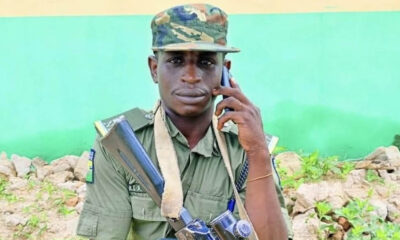
 metro1 day ago
metro1 day agoUpdated: Notorious bandit leader Bello Turji goes berserk, kills 12 for Eid
-

 metro2 days ago
metro2 days agoEdo Gov Okpebholo wins round one as tribunal upholds his election
-

 metro2 days ago
metro2 days agoPolice hunt for last suspect in LASU graduate killing
-

 metro1 day ago
metro1 day agoSouth African court acquits Nigerian pastor of rape after 8 years in jail
-

 Entertainment2 days ago
Entertainment2 days agoTuface spotted with Igbinedion’s granddaughter at Edo election tribunal

